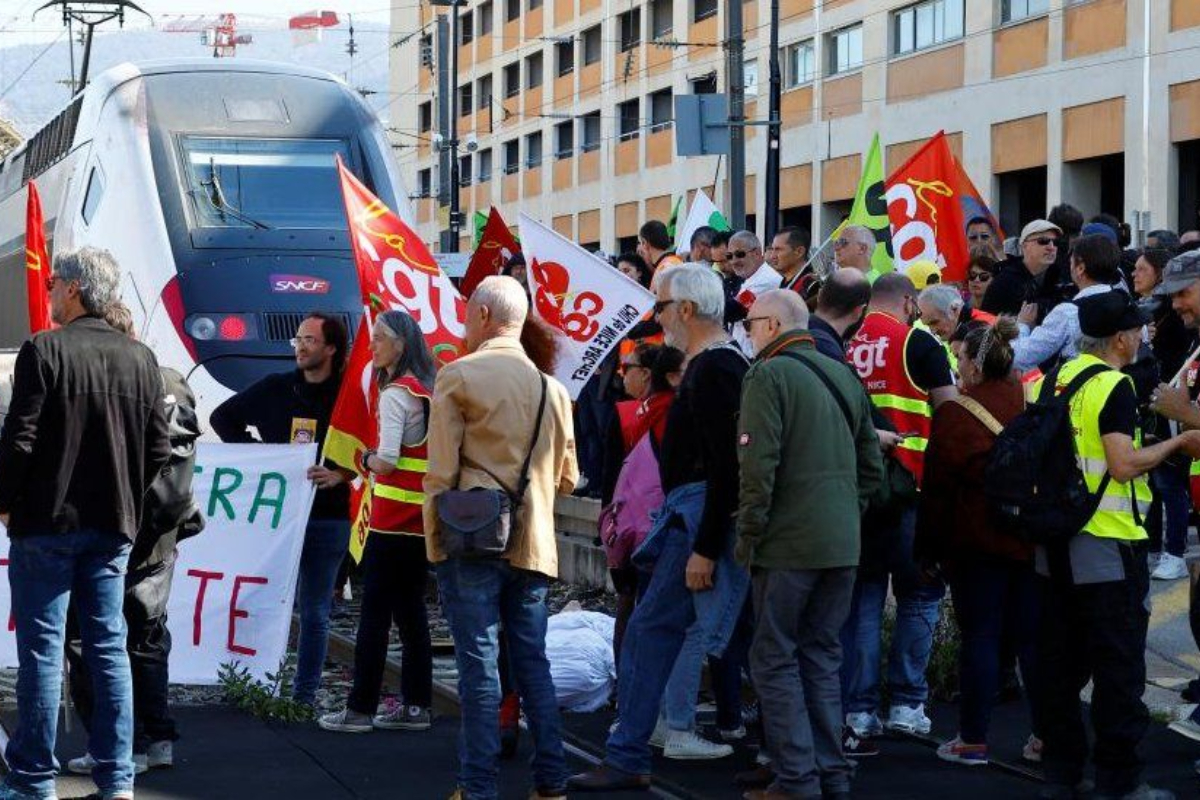- Macron defended his decision to push through an increase in the pension age.
- With a resolute attitude, saying it was a necessity and that the longer he waits.
- The more the deficit will deteriorate.
In the face of nationwide protests and two no-confidence votes, French President Emmanuel Macron has defended his decision to push through an increase in the pension age with a resolute attitude.
“This reform isn’t a luxury, it’s not a pleasure, it’s a necessity,” he said.
The government’s use of constitutional authority to drive through reforms without a vote in the National Assembly has emboldened protesters.
On Thursday, there will be a ninth round of nationwide strikes and demonstrations.
Numerous locations have seen hundreds of arrests over the course of six nights of protests.
Bins that were left overflowing by garbage collectors have been set on fire, and 13% of gas stations are out of gasoline as a result of blockades at oil refineries.
Nearly half of the pumps in the southern Bouches-du-Rhône region have stopped working.
The protests have also cast a cloud over King Charles’s imminent visit to France.
Green MP Sandrine Rousseau called for the trip to be cancelled: “Is the priority really to receive Charles III at Versailles? Something is taking place within French society… the priority is to go and talk to society which is rising up.”
In an interview that was shown on two of the major French TV networks at midday on Wednesday, Mr. Macron made his first public comments regarding the rising pensions debate in response to pressure to defuse the situation.
The French president stated that while protestors had the right to demonstrate in public and that their rage had been taken into consideration, it was unacceptable when they turned violent without regard for any laws.
“Do you think I enjoy passing this reform? No,” he said. Looking to bring in the rise in the pension age by the end of 2023 he said he had a responsibility not to leave the issue alone despite its unpopularity.
The pay-as-you-go pension system in France entails workers footing the bill for pensioners.
Mr. Macron noted that there were 10 million French retirees when he started working and that number has increased to 17 million.
“The longer we wait, the more [the deficit] will deteriorate.” He said it was time to move, reviving dialogue with the unions and all the political forces that were ready to do so. He outlined a list of priorities for the rest of his presidency: reforming immigration laws, building 200 new barracks for military police, schools, health and the environment.
Since he took on the yellow-vest demonstrators in his first term in office, President Macron’s decision to invoke the 49:3 clause to force through an increase in the pension age from 62 to 64 and extend pension contributions is regarded as his biggest political risk.
But now that he leads a minority administration and the retirement change is extremely unpopular, he had a big majority in parliament at the time.
According to Sciences Po political analyst Bruno Cautrès, who has been in office for six years, the president no longer possesses the same “agility” that he did at first, and his most recent comments will not be well received by the unions.
[embedpost slug=”macron-faces-no-confidence-votes-in-the-wake-of-hated-pension-reforms/”]
Union leaders, the National Rally on the Far Right, and the Far Left in France Unbowed parties have come together in outrage over the legislation’s hasty passage by Prime Minister Élisabeth Borne.
The leader of the far-left CGT union, Philippe Martinez, claimed in an interview that the president had duped millions of protestors into believing that his policies were the only option.
The more moderate CFDT’s Laurent Berger accused Mr. Macron of lying and rewriting history to cover up his inability to win a majority in parliament.
Although union leaders predicted that up to 50% of primary school teachers would strike on Thursday, protests continued on Wednesday, including ones outside the southern port of Marseille-Fos.
Marine Le Pen of National Rally said she would not play “any part in putting out the fire” as the president was the only one who had the keys to a political crisis he had himself created.
During his TV interview, Mr. Macron emphasized his continued backing for his beleaguered prime minister: “She has my confidence to lead this government team.”
He allegedly informed party representatives at the Elysée Palace prior to his appearance that there would be no change in course.
He ruled out any drastic action, including a change in the makeup of the government or the dissolution of the legislature.
It was “always a good thing if you want to be respectful of our institutions,” Mr. Macron told his colleagues, adding that he had no regrets about pushing through the reforms.
He and the prime minister have maintained that 175 hours of parliamentary debate had been spent on the measures.
Mr. Macron emphasized that several parties had supported the change during its passage through the legislature but then sponsored a motion of no confidence that narrowly failed.
Prior to Monday’s vote in parliament, the government realized that it had not garnered enough support, particularly from the right-wing Republicans.
Asked during his TV interview if he had any regrets, President Macron said that if he had one it was in not succeeding in convincing people of the necessity of the reform: “But I don’t live with regret, I live with will, tenacity, engagement, because I love our country and people.”
[embedpost slug=”macrons-government-survives-no-confidence-vote-on-pension-reform/”]





















